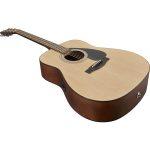Who Invented the Guitar: Throughout the annals of history, the guitar emerged as a venerable and emblematic musical instrument, captivating the souls of artists and aficionados across epochs. Its mellifluous strumming and poignant chords resound harmoniously through diverse genres and societies, rendering it a universal emblem of artistic ingenuity and emotional expression.
But behold, the inquiry arises: Who can be attributed to the birth of this illustrious instrument? Who, indeed, can be heralded as the mastermind behind the guitar’s inception? Embarking on an expedition of exploration, we shall trace the labyrinthine trajectory of the guitar’s evolution, harkening back to antiquity and unearthing the visionaries who sculpted it into the marvel it is today.

Ancient Origins and Antecedents of Who Invented the Guitar
To fathom the inception of the guitar, one must embark on a journey delving into its antiquated roots and precursors. The tale commences with archaic stringed contrivances discovered within diverse cultures across the globe. From the time-honored oud of ancient Mesopotamia to the medieval European lute, these instruments laid the foundation for the evolution of the guitar. While they bore resemblances to one another, the guitar possessed idiosyncratic traits that rendered it truly distinct.
Birth of the Modern Guitar (Who Invented the Guitar)
Amidst the realm of musical instrument creation, the emergence of the contemporary guitar finds its roots in a lineage of ingenious inventors who daringly pushed the frontiers of their craft. Amongst these visionary artisans, one name emerges with unparalleled prominence – Antonio de Torres, an esteemed luthier originating from Spain. It was during the 19th century when Torres’s artistic brilliance engendered a revolution, fundamentally transforming the very nature of guitar construction. Through his pioneering endeavors, he introduced the groundbreaking concept of fan bracing, an innovative structural technique that left an enduring impact on the guitar’s timbral opulence and projection. This transformative invention resonates through the annals of time, sculpting the evolution of the cherished instrument we hold dear today.

In the grand tapestry of musical craftsmanship, one cannot disregard the eminent figure of Christian Frederick Martin, a distinguished German-American luthier whose instrumental role in the genesis of the steel-string acoustic guitar remains unparalleled. Martin’s ingenuity in design and construction techniques metamorphosed the guitar into a superlative and versatile musical instrument, endearing it to the hearts of folk and country musicians.
Our Post
- Yamaha Guitar Under 5000 And What different from others?
- Yamaha FX280: Affordable Excellence in Electro-Acoustic Guitars
- Yamaha f310 vs fs100c Comparison: Which guitar is better?
Orville Gibson, an American inventor, introduced the concept of the archtop guitar, featuring a carved top and back for improved sound resonance. This invention started the evolution of the electric guitar, leading to the jazz guitar and eventually the electric solid-body guitar.
Evolution and Popularization
The guitar, as it underwent metamorphosis and expansion, elegantly integrated itself into various musical genres, becoming an indispensable element in the vast realm of music. In the captivating domains of blues and jazz, adept musicians such as Robert Johnson and Charlie Christian splendidly showcased the astounding prowess of this marvelous instrument, adorned with six strings, thereby forging the way for innumerable aspiring artists to tread upon.

The rise of rock and roll brought guitar legends like Chuck Berry and Jimi Hendrix. Whose virtuosity and showmanship propelled the guitar to the forefront of popular music. Simultaneously, in the realm of folk and singer-songwriters, artists. Such as Bob Dylan and Joni Mitchell have used the guitar as a medium for storytelling and personal expression. Solidifying its role as a symbol of introspection and social commentary.
In the digital age, the guitar was not immune to technological advances. From the introduction of electric pickups to the development of digital effects, guitars have embraced innovation and opened up new possibilities for musicians. Additionally, online platforms and resources have democratized guitar learning. Which allows aspiring players worldwide to access tutorials, lessons, and a global community of guitar enthusiasts.

Looking ahead, the future of the guitar holds endless possibilities. Advances in materials, manufacturing techniques, and digital interfaces are poised to shape the evolution of devices. From innovative guitar designs to groundbreaking playing techniques, the guitar will continue to evolve and adapt to the changing musical landscape.
Conclusion of Who Invented the Guitar
Who Invented the Guitar: The invention of the guitar was not the work of a single individual but rather a collective effort spanning centuries. From ancient string instruments to the inventions of Antonio de Torres, Christian Frederick Martin, and Orville Gibson, the guitar’s journey has been one of constant reinvention.
It has captivated generations with its melodic beauty and empowered countless musicians to share their stories and emotions through its strings. As we continue to unfold new chapters in guitar history. Let us celebrate the visionaries who paved the way and look forward to the exciting future that lies ahead for this timeless machine.



